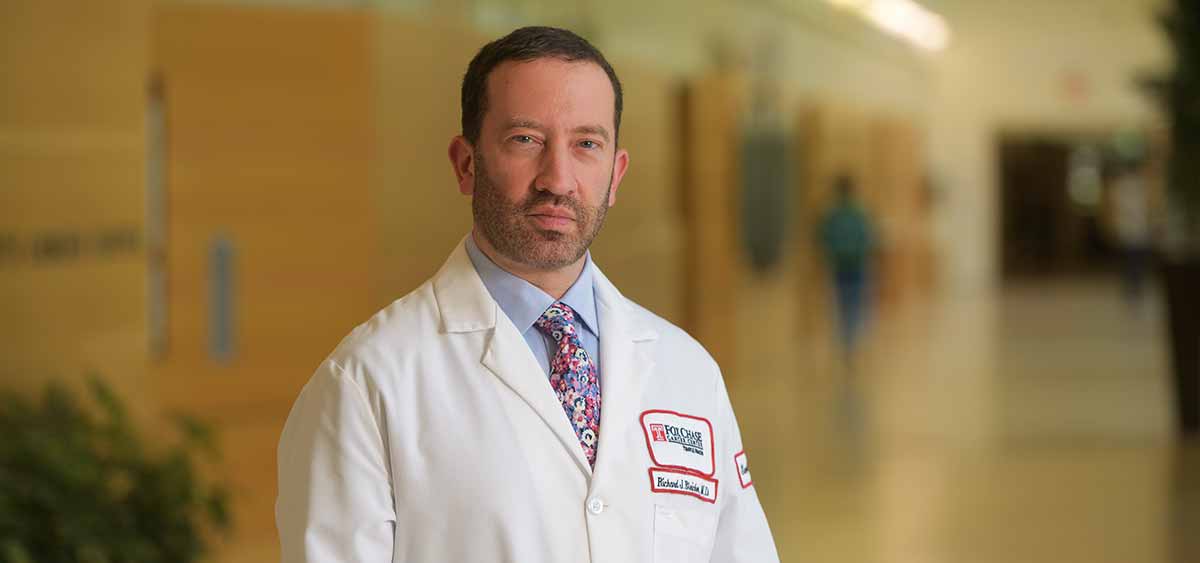
PHILADELPHIA (November 15, 2019) – Although delays between diagnosis and treatment of all types of breast cancer do have measurable effects on patient survival, a new study by researchers from Fox Chase Cancer Center has found that these effects on survival do not differ based on the type of breast cancer diagnosed.
Breast cancer comprises several types, the most common of which are receptor-positive, (which expresses the estrogen receptor [ER] and/or progesterone receptor [PR]), HER2-positive, and triple-negative disease, which tests negative for ER, PR, and HER2.
“With triple-negative breast cancer there is a higher likelihood of developing distant metastases in the first three years compared with other types of breast cancer,” said lead author Richard J. Bleicher, MD, FACS, a professor in the Department of Surgical Oncology at Fox Chase. “Because of that, there has long been an assumption that these patients need to get to surgery or start chemotherapy earlier.”
There are, however, no studies that have looked at whether patients with triple-negative disease do, in fact, need their treatment started sooner than women with the other types of breast cancer.
To explore this question, Bleicher and colleagues reviewed data from more than 350,000 women with invasive breast cancer in the National Cancer Database who were diagnosed between 2010 and 2014. Of these women, more than 10 percent had triple-negative disease.
The researchers looked at three outcomes: the number of days from diagnosis to surgery, days from surgery to chemotherapy, and days from diagnosis to chemotherapy.
They found that the type of breast cancer did predict treatment delays. Patients with triple-negative disease had the shortest time to surgery and chemotherapy (29.9 and 72.7 days) compared with patients with HR-positive disease (31.6 and 78.0 days) and HER2-positive disease (31.5 and 74.4 days).
Additionally, delays in treatment did have a small negative effect on overall survival. “We found that delays do matter and do have a negative effect on outcomes in patients with triple-negative disease,” Bleicher said. “But this also occurred with the other types, and there was no difference in the effect of the delay between the three phenotypes of breast cancers.”
When the researchers looked at time from diagnosis to surgery, time from surgery to chemotherapy, and time from diagnosis to chemotherapy, there was no difference between the three types of breast cancer regarding the effect of these delays in each of these intervals on survival.
“This completely flies in the face of what we have always assumed,” Bleicher said. “There are very good reasons to give chemotherapy before surgery in each of these phenotypes of breast cancer that have nothing to do with treatment times. But while preoperative chemotherapy is sometimes advocated solely to rush the start of treatment faster than surgery, unless delays are anticipated, these data tell us that switching the order of treatment specifically for this reason is not likely to help these patients. Most importantly, there need not be panic about starting treatment more quickly about triple-negative tumors as versus others.”
The paper, “Time to Surgery and the Impact of Delay in the Non-Neoadjuvant Setting on Triple-Negative Breast Cancer and Other Phenotypes,” was published in Annals of Surgical Oncology.
This study was supported by a United States Public Health Services grant and a private donation from the Marlyn R. Fein Chapter of the Fox Chase Cancer Center Board of Associates.